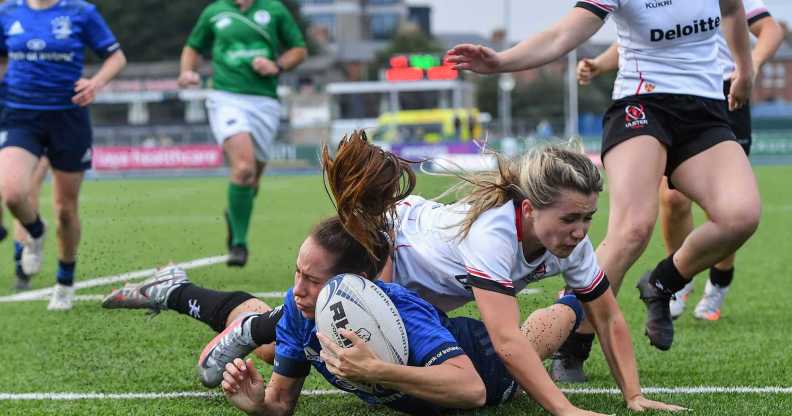Ulster Rugby barred from Belfast Pride over ban on trans players

Ulster Rugby has been barred from Bristol Pride due to its parent organisation’s trans sports ban. (Piaras Ó Mídheach/Sportsfile via Getty Images)
Ulster Rugby will not be permitted to attend the “unapologetically trans-inclusive” Belfast Pride parade this year due to its governing body’s trans sports ban.
Ulster Rugby, which is governed by the Irish Rugby Football Union (IRFU), had its 2023 application to be part of the parade rejected due to the IRFU’s 2022 policy of excluding trans women from playing contact rugby on women’s teams.
The Belfast Pride parade, which will take place on 29 July with the theme of “stand by your trans”, has been described by organisers as “unapologetically trans-inclusive”.
A spokesperson for Belfast Pride said: “Trans, non-binary and gender-diverse people have helped lead and shape not only the Pride movement, but the wider LGBTQIA+ civil rights movement, and are an integral part of our community and wider society.
“We believe trans, non-binary and gender-diverse people should be supported, accepted and celebrated within families, communities and across wider society.”
‘Integral part of our community and wider society’
Ulster Rugby’s rejection from the parade follows IRFU bosses implementing a ban on trans women from playing female contact rugby in its women’s teams in 2022.
At the time, the IRFU said the decision was based on “medical and scientific evidence” and that peer-reviewed research showed there were “physical differences between those people whose sex was assigned as male and those as female at birth”.
The IRFU has defended its gender participation policy, stating that its guidance is in line with World Rugby guidance, which is “subject to ongoing review”.
‘We recognise that this is a sensitive and challenging area’
In a statement to the BBC’s Talkback programme, the union reiterated that while trans women are banned from contact rugby, trans men will be allowed to play for men’s teams “if they provide written consent and a risk assessment is carried out”.
“We recognise that this is a sensitive and challenging area for those involved, and the wider LGBTQIA+ community, and our collective aim is that trans, non-binary and gender non-conforming people who support and play our game will remain within the rugby family,” the Irish Rugby Football Union’s statement read.
In August 2022, when the IRFU trans sports ban was announced, more than 2,000 individuals and organisations had signed a letter from charity Mermaids calling for trans-inclusive guidelines in sport.
Last year, British bodies for cycling, swimming, rugby and triathlon all announced policies banning trans women from competing in women’s categories.
Bans on trans athletes have been brought in across a range of sports despite research finding that trans women do not have any advantages over any other women when competing in elite sporting competitions.
The Canadian Centre for Ethics in Sport’s report found that biomedical factors do not pose an advantage, but social factors – like nutrition and training quality – do.
How did this story make you feel?

